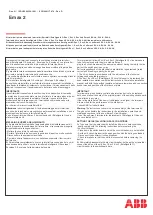
Instructional Leaflet
IL003002EN
Effective September 2013
Mechanical interlock kit BRMIKCSR
installation instructions
eaton
www.eaton.com
Step 9
Install the mechanical interlock assembly with
four
(B)
screws according to
Figure 3
by installing
screws from the back side of the trim/door.
otee:
n
Interlock assembly will not attach correctly
if screws are not installed from the back side of
the trim/door.
Step 10
Place labels according to
Figure 5
.
Step 11
Re-attach trim/door to the enclosure using the
original screws.
Step 12
Confirm interlock prevents main breaker and
generator breaker from being in the ON position
at the same time.
warning
BEFORE ENERGIZING LOADCENTER, RE-CHECK ALL
ELECTRICAL CONNECTIONS AFTER ALL WIRING
HAS BEEN COMPLETED AND BREAKERS HAVE BEEN
INSTALLED IN THE LOADCENTER. INCORRECT WIRING
CAN CAUSE PRODUCT FAILURE, PROPERTY DAMAGE,
OR PERSONAL INJURY.
trim/doors without pre-installed drill points only
Step 13
Place inner trim/door on a firm surface with the
front of the trim/door facing down.
Step 14
Mount the interlock assembly to the trim/door
according to
Figure 4
with four
(B)
screws by
installing screws from the back side of the trim/
door through the main breaker opening.
Figure 3. with Pre-installed Drill Points only /
Points de perçage préexistants seulement /
Únicamente para tapas con puntos de
perforación instalados previamente
Figure 4. without Pre-installed Drill Points
only / Pas de points de perçage préexistants
seulement / Únicamente para tapas sin puntos
de perforación instalados previamente
Figure 5.
Étape 9
Installer le système de verrou mécanique avec
quatre vis
(B)
posées depuis la face arrière
du panneau d’habillage/de porte comme sur
la
Figure 3
.
emarrue e:
r
Le système de verrouillage ne
s’attache pas correctement si les vis ne
sont pas posées depuis l’arrière du panneau
d’habillage/de porte.
Étape 10
Apposer les étiquettes comme sur la
Figure 5
.
Étape 11
Remonter le panneau d’habillage/la porte sur
l’armoire à l’aide des vis d’origine.
Étape 12
Vérifier que le verrou empêche le disjoncteur
principal et le disjoncteur de groupe électrogène
d’être en position de marche (ON) en même
temps.
aVErtiSSEMEnt
AVANT DE REMETTRE LE PANNEAU DE
DISTRIBUTION SOUS TENSION, REVÉRIFIER TOUS
LES RACCORDEMENTS ÉLECTRIQUES UNE FOIS QUE
TOUS LES CÂBLAGES SONT TERMINÉS ET QUE LES
DISJONCTEURS SONT INSTALLÉS DANS LE PANNEAU
DE DISTRIBUTION. UN CÂBLAGE INCORRECT PEUT
PROVOQUER UNE DÉFAILLANCE DE PRODUIT,
DES DÉGÂTS MATÉRIELS OU DES BLESSURES
CORPORELLES.
Panneaux d’habillage/de porte sans points
de perçage préexistants seulement
Étape 13
Placer l’habillage intérieur/la porte sur une surface
ferme, face avant vers le bas.
Étape 14
Monter le système de verrou mécanique sur
le panneau d’habillage/de porte comme sur la
Figure 4
avec quatre vis
(B)
posées depuis
la face arrière du panneau à travers l’ouverture
de disjoncteur principal.
Paso 9
Instale el juego de enclavamiento mecánico
con cuatro tornillos
(B)
según se indica en la
Figura 3
a través de la instalación de tornillos
en la parte posterior de la tapa.
otae:
n
El conjunto de enclavamiento no se ajustará
correctamente si los tornillos no son instalados en
la parte posterior de la tapa.
Paso 10
Coloque las etiquetas según la
Figura 5
.
Paso 11
Vuelva a ajustar la tapa en el receptáculo utilizando
los tornillos originales.
Paso 12
Confirmar que el enclavamiento evitará que el
interruptor principal y el interruptor del generador
estén en la posición ON (ENCENDIDO) al mismo
tiempo.
aDVErtEncia
ANTES DE SUMINISTRAR ENERGÍA ELÉCTRICA AL
CENTRO DE CARGA, VUELVA A VERIFICAR TODAS
LAS CONEXIONES ELÉCTRICAS LUEGO DE QUE
SE HA REALIZADO TODO EL CABLEADO Y LOS
INTERRUPTORES SE HAN INSTALADO EN EL CENTRO
DE CARGA. EL CABLEADO INCORRECTO PUEDE
PRODUCIR FALLAS EN EL PRODUCTO, DAÑOS A LA
PROPIEDAD O LESIONES PERSONALES.
Únicamente para tapas sin puntos de
perforación instalados previamente
Paso 13
Coloque la tapa interna sobre una superficie firme
con la parte frontal de la placa hacia abajo.
Paso 14
Instale el conjunto de enclavamiento mecánico en
la tapa como se muestra en la
Figura 4
con cuatro
tornillos
(B)
, colocando los tornillos en la parte
posterior de la tapa a través de la apertura del
interruptor principal.
4
























